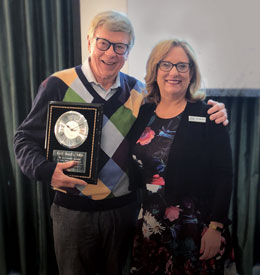Ask the Doctor: NMO – It’s No Longer Considered a Form of MS
By Dr. Barry A. Hendin
MSAA’s Chief Medical Officer

We welcome Dr. Barry Hendin as MSAA’s new chief medical officer! Dr. Hendin’s appointment follows the retirement of MSAA’s longtime chief medical consultant, Dr. Jack Burks, in June.
Barry A. Hendin, MD, is a highly accomplished neurologist who specializes in MS and has spoken at several of MSAA’s educational programs. Dr. Hendin currently practices medicine at Phoenix Neurological Associates, Ltd., where he has been a neurologist for the past 45 years. He also holds the position of director of the Multiple Sclerosis Clinic at Banner University Medical Center and is a clinical professor of neurology at the University of Arizona Medical School.
Dr. Hendin has been appointed to nearly 30 councils, committees, board of directors, and a task force, all in the fields of medicine, patient care, education, and research. He has received more than a dozen honors and awards, co-authored more than 30 medical articles, and given more than 50 presentations to medical professionals. Additionally, Dr. Hendin has been the principal investigator for more than 115 clinical trials, evaluating the safety and effectiveness of different treatments for a host of neurological conditions.
Q: A friend of mine says that she has a less-common form of MS called neuromyelitis optica (NMO) or Devic’s disease. When I searched online for more information, I saw that NMO is not MS, but is often misdiagnosed as MS. Could you please tell me if this is true, and if so, what are the symptoms of NMO and how does it differ from MS?
A: You are correct that NMO (neuromyelitis optica) or NMOSD (neuromyelitis optica spectrum disorder) is a distinct entity and is no longer believed to be a form of multiple sclerosis. Typical presentations are similar to MS, including optic neuritis (inflammation along the optic nerve) and myelitis (spinal cord inflammation), but some less-frequent symptoms can be intractable hiccups or vomiting.
The major differences are that NMOSD is due to an identified antibody (antiaquaporin 4 antibody) that attacks specialized, star-shaped cells in the brain called astrocytes. These are the most numerous cells in the brain and perform multiple tasks in maintaining, supporting, and repairing the central nervous system. One of the most important roles is maintaining the blood-brain barrier in order to regulate water transfer into the nervous system. Additionally, these attacks are often more severe and destructive than attacks in MS.
Until recently, no FDA-approved therapies were available for NMOSD. Clinicians used immunosuppressive therapies that were approved for other conditions, which is referred to as using a medication “off-label.” However, since that time, the FDA has approved the first therapy for aquaporin-positive NMOSD. This medication, Soliris® (eculizumab), is also approved to treat three other less-common conditions and is given via intravenous (IV) infusion.
Q: I was 57 when I was diagnosed, but I probably had MS for a long time and had no clue. I have been doing very well on a disease-modifying therapy for 12 years. My question is about MS and hormone replacement therapy (HRT). After being on HRT since my mid 40’s, I stopped HRT last year (at age 68) because I was having painful cramps every month and there was no other reason found for this.
However, after stopping HRT, my quality of life became very bad. I have since gone back on HRT every other day, and so far after two months, I’ve had no pain and I feel a lot better. After doing some reading, I think menopause isn’t just an aging phenomenon, but as a book I read said, it is a hormone-deficiency problem. Do you know if any hormone research, especially in older women with MS, is being looked into with any seriousness?
A: Menopause is a normal part of aging that occurs when a woman’s estrogen level falls. It has been estimated that 50% of women with MS are post-menopausal. Many women with MS report an increase in symptoms during this time. A number of small studies have been conducted looking at menopause and the role of HRTs for the treatment of menopause in women with MS. Unfortunately, the studies have been inconclusive. Some women reported an improvement in their MS symptoms with HRTs and some did not.
Many women reported that hot flashes due to menopause transiently worsened their MS symptoms. Others reported that sleep disturbance associated with menopause increased their fatigue as well as cognitive and mood symptoms. Some problems seem to be reciprocal or interactive. For instance, increased bladder symptoms can decrease sleep, and the decrease in sleep can increase MS symptoms.
Clearly, we need to study the post-menopausal phase of life more closely. We need to understand the complex interaction of aging, hormonal effects, and MS. It is equally clear that we need to focus attention on quality-of-life issues that occur in post-menopausal women with MS. These issues include the role of disease-modifying therapies, HRTs, and the medical consequences of aging in MS. We also need to pay attention to age-related issues such as osteoporosis, bladder function, cognition, mood, mobility, societal engagement, and general quality of life. We hope to see more studies with MS patients in the future.
Q: I am the primary caregiver for my 14-year-old son who was recently diagnosed with MS. One of the questions I have is, why is he heat-sensitive? For example, we live in Florida, and prior to being diagnosed with MS, my son played soccer and could play outside in the heat for hours. Since his diagnosis, he has trouble walking for more than 30 feet. He is fine for the first few minutes, but then his body shuts down – particularly with his left foot.
What I don’t understand is why this happens and how to get this better. He changed his diet (eliminated dairy, gluten, and red meat), exercises five-to-six times a week, only drinks water, and takes recommended supplements.
A: First, as noted in this issue’s cover story, I wanted to reiterate that increasing attention has been focused on pediatric multiple sclerosis and the need to treat young people with MS early and effectively in order to maintain long-term function and to reduce disability. Previously, most clinical trials focused on adults (18 and older). Gilenya® (fingolimod) has been approved specifically for pediatric MS, but most of the other disease-modifying therapies are used off-label in treating pediatric MS. The future for people with MS – including children with MS – is looking brighter because of our increased understanding of the disease and the increased availability of effective therapies.
Second, to answer your question about why your son is heat-sensitive, heat slows the conduction of nerve signals along demyelinated nerves. This makes the transmission of nerve signals less efficient, so messages from the brain and spinal cord going to other parts of the body are delayed. Additionally, the body must work harder to transmit these signals.
Fortunately, this is a temporary effect and should resolve after your son cools off. Several strategies will help to reduce heat-related symptoms, including good hydration, drinking nonalcoholic frozen beverages, staying inside during the hottest times of the day, using air conditioning, and wearing cooling devices such as cooling vests and other accessories. MSAA’s Cooling Distribution program provides free cooling vests (including vests for children) and accessories to those who qualify. Many people who use this type of cooling technology find that they may return to their outdoor summertime activities and their symptoms of heat sensitivity are greatly reduced.
Please Submit Your Questions To:
MSAA
Questions for Ask the Doctor
c/o Dr. Barry A. Hendin
375 Kings Highway North
Cherry Hill, New Jersey 08034
Questions may also be emailed to askdr@mymsaa.org. Please be sure to include “Ask the Doctor” in the subject line.
Jack Burks, MD, Retires
 Everyone at MSAA would like to wish Dr. Jack Burks all the best in his retirement from his position as MSAA’s chief medical consultant. He worked with MSAA for many years and has been a wonderful resource, advisor, and friend. As Dr. Burks concludes his MS career, he shares these parting words to follow.
Everyone at MSAA would like to wish Dr. Jack Burks all the best in his retirement from his position as MSAA’s chief medical consultant. He worked with MSAA for many years and has been a wonderful resource, advisor, and friend. As Dr. Burks concludes his MS career, he shares these parting words to follow.
“I want MSAA’s members and families, as well as my colleagues and friends, to know how much I have appreciated the opportunities to share my knowledge and insights. I want to thank the dedicated client-focused staff at MSAA, along with the members of MSAA’s Healthcare Advisory Council and Board of Directors. I am proud to have worked with each of you in our continuing quest to improve the lives of everyone affected by MS.
“In addition to my work at MSAA, my career highlights include helping to establish several MS centers in the United States and MS programs in 50 countries. I have spoken at several medical conferences, taught at universities, and written a number of MS textbooks and research papers. However, my proudest accomplishment was to raise three wonderful, successful, and loving children. They are now pursuing their own careers and living in Seattle, Beijing, and London.
“I want to emphasize to the MS community that the medical field has already made much progress in limiting MS damage. Soon, ways to repair and restore lost function will be discovered – and nothing would make me happier. I also would like to note that professionally, I was honored to have been a part of the MSAA team for so many years.”
